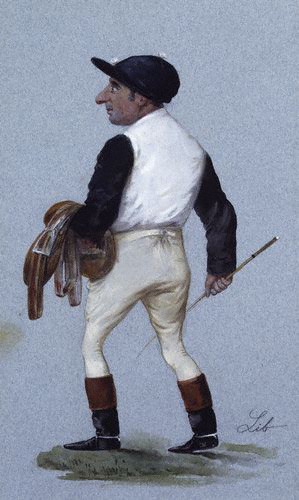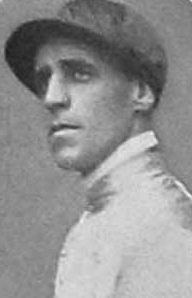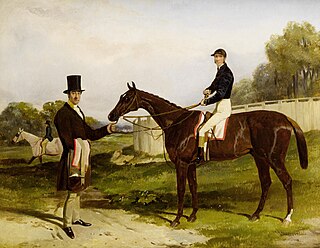
Frederick James Archer, also known by the nickname The Tin Man, was an English flat race jockey of the Victorian era, described as "the best all-round jockey that the turf has ever seen".

Francis Buckle (1766–1832), known to the British horse racing public as "The Governor", was an English jockey, who has been described as "the jockey non-pareil" of the opening quarter of the 19th century, and the man who "brought respectability to race-riding". He won at least 27 British Classic Races during his career, a record which would not be beaten for over 150 years.
Robert Robson (c.1765–1838) was a horse trainer, known as the Emperor of Trainers who ran "the outstandingly successful stable of the first quarter of the 19th century."The leading racehorse trainer of his time, he raised their status from glorified groom to professional.

Samuel "Sam" Chifney, also known as Sam Chifney Sr., Sam Chifney the Elder or Old Sam Chifney to distinguish him from his son, was an English jockey. He was a pioneer of professional race-riding, developing a trademark late finishing style, known as the 'Chifney rush' and was the retained jockey of the Prince of Wales. He became the leading horseman of his day, winning four runnings of the Oaks and one of the Derby, but his career ended in ignominy after a scandal around a ride on the Prince of Wales's horse, Escape. Despite inventing a bit for horses that is still in use today, he died in debtors' prison in London.

Sailor (1817–1820) was a British Thoroughbred racehorse. In a brief racing career in the spring and summer of 1820 he won both of his races including The Derby. He collapsed and died on the Newmarket gallops shortly after his Derby win.

Sam was a British Thoroughbred racehorse and sire. In a career that lasted from April 1818 to May 1819 he ran nine times and won three races. In May 1818 he defeated fifteen opponents to record his most important win in The Derby. His only other wins came in a walkover and a match race. After running without success as a four-year-old, Sam was retired to stud but made no impact as a sire of winners.

Skyscraper (1786–1807) was a British Thoroughbred racehorse. One of many notable offspring of the great Highflyer, Skyscraper is best known for winning The Derby of 1789. He competed until he was seven, when after losing two races he was retired to stud.
Briseis (1804–1824) was a British Thoroughbred racehorse and broodmare who won the classic Oaks Stakes at Epsom Downs Racecourse in 1807. Her win in the Oaks was her third win from as many starts, but she was beaten in her remaining three races before being retired from racing in 1808. At stud she proved to be a successful broodmare, producing several good winners including the dual classic winner Corinne. The mare's name was often spelled Briseïs.
Sorcery was a British Thoroughbred racehorse and broodmare who won the classic Oaks Stakes at Epsom Downs Racecourse in 1811. In a racing career which lasted from April 1811 to July 1814 the filly ran twenty-six times, winning twelve races and finishing placed on eleven occasions. Sorcery won the Oaks on her third racecourse appearance and went on to win other important races including the Epsom Gold Cup, the Trial Stakes, two editions of the Oatlands Stakes, a King's Plate and several match races. After her retirement from racing she became a successful broodmare, being the dam of the 1828 Epsom Derby winner Cadland.
John Arnull (1753-1815) was an English flat racing jockey. He was the first man to ride five Epsom Derby winners and a member of the dominant race riding family in England in the late 18th and early 19th Centuries.

Charles Wood (1854–1945) was an English flat racing jockey.
John Singleton, was an English horse racing jockey of the late 18th and early 19th century. He was actually the third John Singleton from the same family to achieve prominence in racing circles, following his father John and his great uncle John.

Joseph Childs (1884–1958) was a French-born, British-based flat racing jockey. He won fifteen British Classics in a 35-year career, the last ten years of which were spent as jockey to King George V. He was known for riding a slow, waiting race, and also for having a short temper which regularly saw him at odds with his trainers and owners.

William Clift (1762–1840), born Wentworth, South Yorkshire, was a British jockey. He won the first runnings of both the 1,000 Guineas and 2,000 Guineas and was the first jockey to win all five of the British Classics.

Dennis Fitzpatrick (1764–1806) was an Irish, five-times British Classic winning jockey. He was the first Irish professional jockey to ride in England and competed in some of the most notable match races of the 19th century versus fellow jockey Frank Buckle.

Frank Butler was an English jockey who became one of the country's top riders. In a period of about 11 years he won The Derby twice, The Oaks on six occasions, the Two Thousand Guineas twice, the One Thousand Guineas twice, the St Leger, the Goodwood Cup on three occasions and the Triple Crown on West Australian. In his final years of racing he won 143 races from 384 starts. Illness forced him to stop riding in 1854 and he died two years later at the age of 39.

Henry Custance was a British jockey who won the Derby three times in the 1860s and 1870s.

Tom Chaloner was an English jockey who won ten British Classic races, each of them except the 1,000 Guineas at least once. Although he won races across the country, his most notable came in the north of England.

Frederic E. Webb (1853–1917) was a British Classic winning jockey.
Richard Goodisson was an English classic-winning jockey and trainer, who won the first three runnings of the Oaks Stakes between 1779 and 1781.















